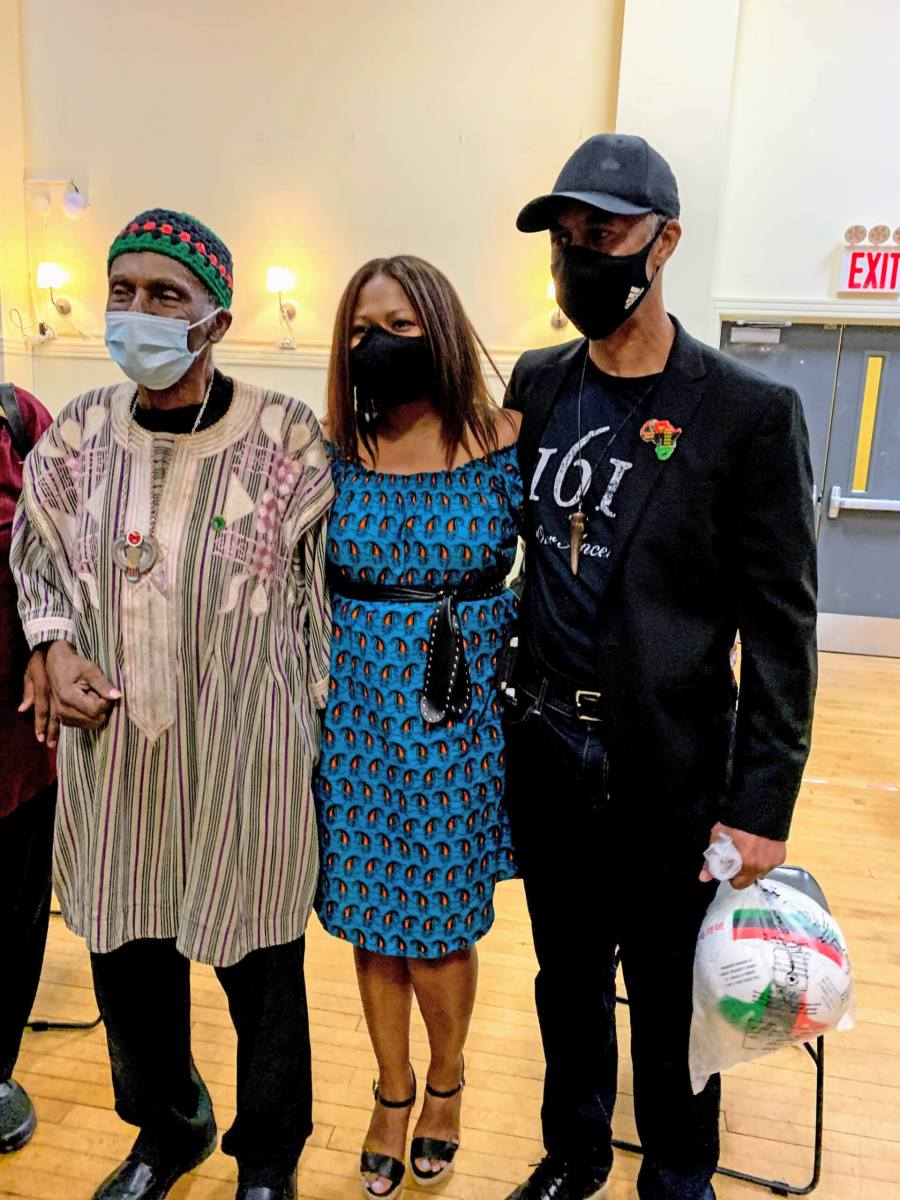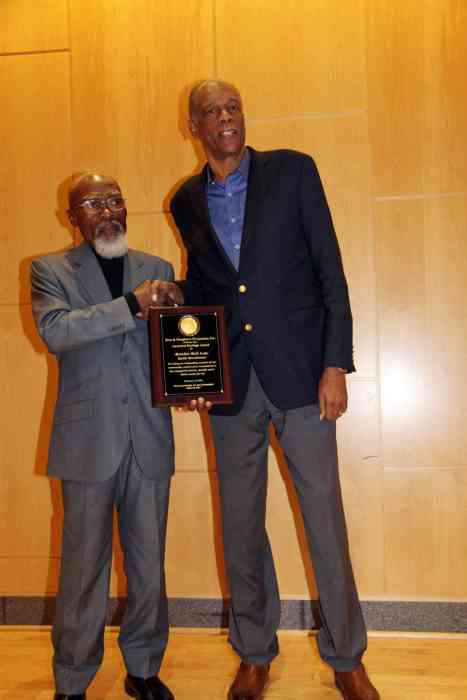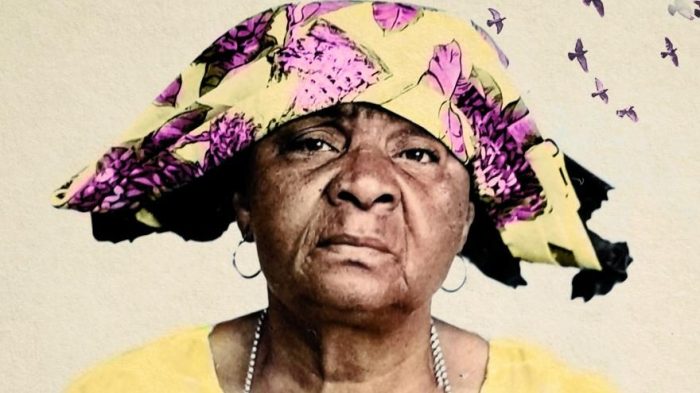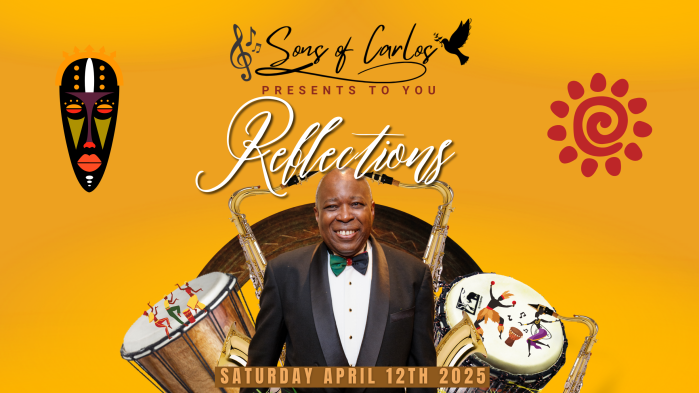As if in response to a call to action Marcus Mosiah Garvey admonished to his followers more than a century ago when he said “(Look) Up You Mighty Race…accomplish what you will,” on the eve of the 134th anniversary of his birthday, a capacity crowd filled a Harlem venue to view the biopic “African Redemption: The Life and Legacy of Marcus Garvey.”
They gathered inside the Joseph P. Kennedy Center located blocks away from Garvey’s former residence in the village Garvey toiled to empower Blacks; inform the audacity of white supremacy and unify with Africa for the first public screening of an anticipated documentary. Invited by filmmaker Roy T. Anderson and Allison, his producer/partner/wife, they asked compliance of being checked at the door for an 87-minutes tour de force.
The select audience included former Harlem Congressman Charles Rangel, former CUNY Professor Leonard Jeffries and scores of guests willing to be temperature checked, sanitized, socially distanced and masked throughout the screening.
Covid-19 precautions disallowed a full capacity crowd which would have included scholars, intellectuals and beneficiaries of Garveyism.
No one seemed deterred by the entrance policy.
Determined from anticipation of enlightenment of a definitive document about perhaps the very first Civil Rights leader, a Black, newspaper publisher, philosopher, Pan-African advocate, father, husband, immigrant, non-conformist and revered “Negro Moses” they arrived at dusk to witness the early evening feature.
Spoiler alert — the film is narrated by recurring Emmy Award winning actor Keith David.
From start to finish David’s voice resonates with over-arching presence as if Garvey himself approved the project. When he tells the story about Garvey’s journey from 1887 to 1940, even James Earl Jones might yield to God calls.
How the actor managed to relate the life history of a born Jamaican who in only 52 years was able to impact the lives of millions of people throughout the world by inspiring musicians, motivating a Rastafarian movement and instilled pride in Blackness reeled the personification of eloquence.
Elocution 101.
Perhaps it was Anderson’s pen that must also be credited with providing compelling, simple, comprehensive, credible, relatable, engaging, and untold data about the trailblazing Jamaican.
Born Aug. 17, 1887 Garvey died June 10, 1940.
Retitled from “Marcus Garvey: Untold Stories,” the redemptive tale combines re-enactments that introduces actor Paul Williams.
His haunting resemblance of the Pan-African often provokes a double-take to the projection.
Audiences seemed riveted to the progression of facts they already seemed versed and except for occasional expressions of malcontent to injustices imposed by powers in the USA, England and Jamaica, throughout the screening prolonged hushed periods prevailed.
Some reacted to interviews, commentaries, re-enactments, photographs, archival footage and musical interludes.
Some seemed familiar with vintage footage showcasing members of Garvey’s gem organization — Universal Negro Improvement Association – marching through Harlem however, most engaging were details of his private life, arrest, deportation, and redemption.
Afterwards an anonymous patron commented that prior to seeing the film she assumed reggae icon Bob Marley composed the lyrics: “Emancipate yourself from mental slavery, none but ourselves can free our minds…”
The film reveals MMG’s attribution to the words Marley put to music,
David Hinds lead singer of British reggae band Steel Pulse amplified Garvey’s life’s endeavor providing sounds and music imploring legions to elevate the banner Garvey said represents African people with lyrics to “rally ‘round the red, black and green.”
His colleagues Third World, Sean Paul, Chronixx, jah9, Sister Carol, poet Mutabaruka echoed his comments.
In addition to hailing the Pan-African, the poet credited creative members within the Rastafarian community for relentlessly perpetuating the memory of the unpardoned hero.
He named Burning Spear and Marley influencers of Garvey’s philosophy.
The filmmaker took his lens to Cape Coast, Ghana where a door of ‘No Return’ still marks the destiny of captured Africans ultimately sold into slavery.
There in that city Seestah Imahkus, an American repatriated with her husband One Africa established traditional lifestyle becoming ‘keepers of the flame.’
Her spacious bed and breakfast attracts guests who rarely check out without getting a diet of Black history. In tribute to Black achievers, she is renowned for plastering the walls of her haven with newspaper clippings hailing outstanding Blacks who have triumphed.
Throughout the years Prof. Leonard Jeffries has visited and revisited the domicile as well as the former Portuguese castles that became dungeons in El Mina and Cape Coast.
Another treat to the presentation introduced Kwame Nkrumah’s daughter Samia.
That the daughter of Ghana’s first president is able to opine on Garvey’s black star vision adds credence to the definitive attributions associated with this must-see project.
In Jamaica, Anderson focused his lens on Queen Mother Mariamne Samad, an endearing Garveyite.
Born in the USA the former model, cultural historian and teacher made a home on the island three decades ago in order to promote Garveyism.
Anderson was able to capture the beauty of her beliefs just before she died in 2019 at age 99.
In addition, he recorded Jamaica’s fifth Prime Minister Edward Seaga who also died that year at 89.
Of all the political controversies associated with the legacy of the US-born naturalized Jamaican politician, his enduring standout cultural contribution will be that Seaga ensured Garvey’s remains were returned to his birthplace in 1964.
The Jamaica Labour Party leader also declared Garvey, the island’s first national hero.
University of the West Indies professor emeritus Carolyn Cooper and Prof. Michael Barnett almost lectures the philosophies of the island’s first national hero.
Their telling perceptions were amplified by comments from actor Danny Glover, Ilyassah Shabazz, daughter of Malcolm X and Betty Shabazz and others.
Images from Coney Island rituals during Tribute to the Ancestors, last year’s protest rallies decrying the murder of Floyd Lloyd, Black Lives Matter Movement demonstrations showing a Haitian flag subtly injects reminders of 21st century challenges faced by Blacks in America.
There are a few documentaries that attempt to showcase the emergence of the UNIA and the trials the Jamaican trailblazer endured while living abroad.
However, there are none as willing to explore Garvey’s indulgences.
In the end, the Anderson’s accomplished an unrivaled feat by providing an uplifting tribute to a universal leader who died much too early.
“African Redemption: The Life & Legacy of Marcus Garvey” should be recommended addition to schools, libraries and media outlets.
Catch You On The Inside!

























